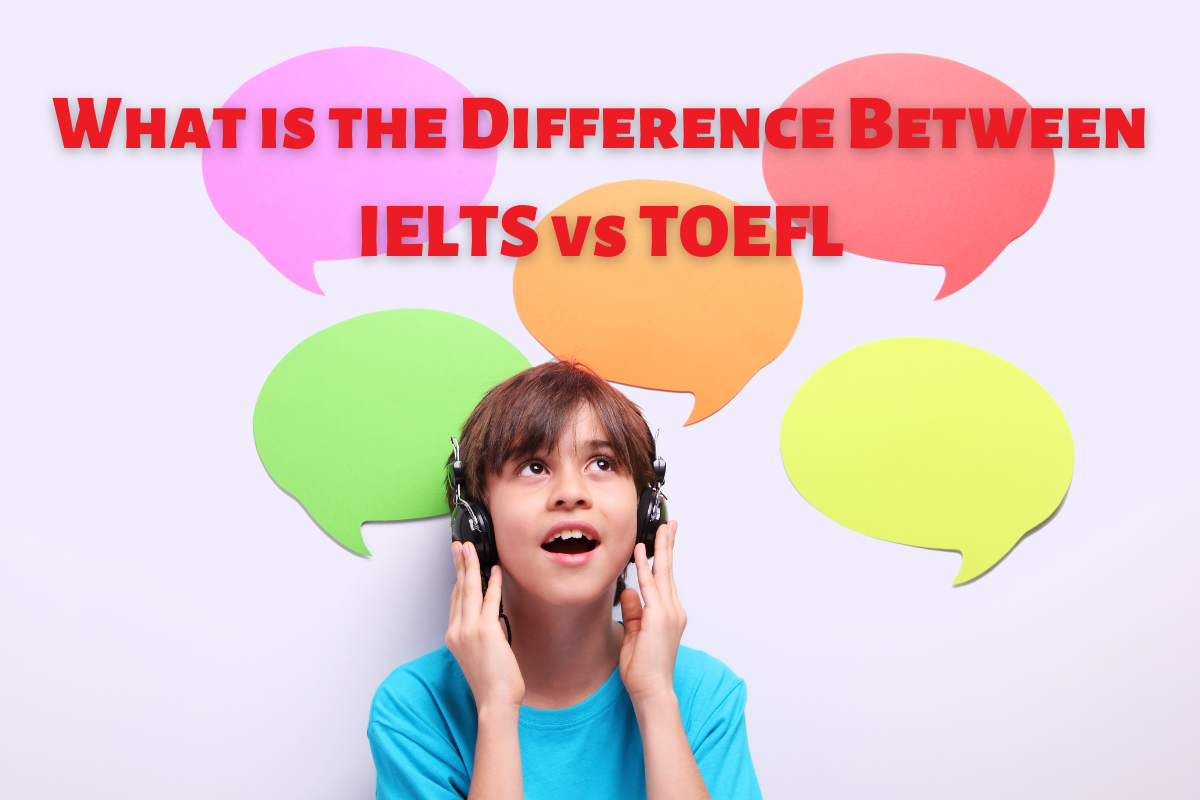What is the Difference Between IELTS vs TOEFL?
IELTS vs TOEFL
IELTS (International English Language Testing System) and TOEFL (Test of English as a Foreign Language) are two of the most widely recognized standardized tests used to evaluate the English language proficiency of non-native speakers. Here are some key differences between the two:
- Test format: IELTS has two versions, Academic and General Training, while TOEFL has only one format. IELTS includes four modules (Listening, Reading, Writing, and Speaking) and takes around 2 hours and 45 minutes, while TOEFL consists of four sections (Reading, Listening, Speaking, and Writing) and takes around 4 hours.
- Test content: IELTS tends to focus on British English, while TOEFL focuses on American English. IELTS includes a variety of accents from English-speaking countries, while TOEFL features primarily American accents. Additionally, the reading and writing sections of IELTS tend to be more challenging than those of TOEFL.
- Scoring: IELTS uses a 9-band scale to report scores, while TOEFL uses a 0-120 scale. Both tests evaluate the test-takers ability to understand and use English, but they use different criteria to evaluate each section.
- Test availability: IELTS is available in more than 140 countries, while TOEFL is available in more than 165 countries. However, both tests can be taken in a variety of formats, including online and in-person.
Overall, both tests are widely recognized and accepted by universities, employers, and immigration authorities around the world. The choice between IELTS and TOEFL depends on individual preferences and requirements.
IELTS – What is it?
IELTS stands for the International English Language Testing System. It is an internationally recognized standardized test that assesses the English language proficiency of non-native speakers who wish to study or work in English-speaking countries.
The IELTS test is designed to evaluate the test-takers ability to understand and use English in four key language skills: listening, reading, writing, and speaking. The test is available in two versions: Academic and General Training. The Academic version is intended for those who plan to enroll in universities or other higher education institutions. In contrast, the General Training version is intended for those who want to work or immigrate to an English-speaking country.
The British Council administers the IELTS test, IDP: IELTS Australia, and Cambridge Assessment English, and it is accepted by more than 10,000 organizations worldwide, including universities, employers, immigration authorities, and professional bodies.
The test is typically conducted over two days and includes four separate sections: listening, reading, writing, and speaking. The entire test takes about 2 hours and 45 minutes to complete. The scores are reported on a 9-band scale, with 9 being the highest possible score.
Preparing for the IELTS test involves developing your English language skills, familiarizing yourself with the test format, and practicing with sample test questions. There are various preparation materials available, including books, online courses, and practice tests.
TOEFL – What is it?
TOEFL stands for Test of English as a Foreign Language. It is an internationally recognized standardized test that measures the English language proficiency of non-native speakers who wish to study or work in English-speaking countries.
The TOEFL test evaluates the test-takers ability to understand and use English in four key language skills: reading, listening, speaking, and writing. The test is used primarily for academic purposes, such as admissions to universities or colleges in the United States and Canada, but it is also accepted by many employers and government agencies around the world.
The TOEFL test is administered by Educational Testing Service (ETS) and is available in both paper-based and internet-based formats. The internet-based test (iBT) is the most commonly used format and includes four sections: reading, listening, speaking, and writing. The entire test takes about four hours to complete.
The TOEFL test is designed to be fair and unbiased for all test-takers, regardless of their cultural and linguistic backgrounds. The test is available in more than 165 countries, and the scores are reported on a scale of 0-120, with each section receiving a score between 0-30.
Preparing for the TOEFL test involves developing your English language skills, familiarizing yourself with the test format, and practicing with sample test questions. There are various preparation materials available, including books, online courses, and practice tests, as well as free resources available on the ETS website.
Different sections of IELTS
The IELTS test consists of four sections, each designed to evaluate a different aspect of the test-takers English language proficiency. Here are the four sections of the IELTS test:
- Listening: The listening section of the IELTS test evaluates the test-takers ability to understand spoken English. The test consists of four recordings, each followed by a set of questions. The test-taker must listen to the recordings carefully and answer the questions as accurately as possible.
- Reading: The reading section of the IELTS test evaluates the test-takers ability to understand written English. The test consists of three reading passages, each followed by a set of questions. The test-taker must read the passages carefully and answer the questions as accurately as possible.
- Writing: The writing section of the IELTS test evaluates the test-takers ability to write in English. The test consists of two tasks: Task 1 requires the test-taker to describe a visual image, such as a chart or graph, while Task 2 requires the test-taker to write an essay on a given topic.
- Speaking: The speaking section of the IELTS test evaluates the test-takers ability to speak in English. The test consists of a face-to-face interview with a certified examiner. The interview consists of three parts: Part 1 involves general questions about the test-takers life and interests, Part 2 requires the test-taker to speak on a given topic, and Part 3 involves a discussion on the topic from Part 2.
Each section of the IELTS test is designed to evaluate the test-takers ability to understand and use English in different ways. The scores from each section are combined to produce an overall band score, ranging from 0 to 9, which indicates the test taker’s English language proficiency level.
Different sections of TOEFL
The TOEFL test consists of four sections, each designed to evaluate a different aspect of the test-takers English language proficiency. Here are the four sections of the TOEFL test:
- Reading: The reading section of the TOEFL test evaluates the test-takers ability to understand written English. The test consists of 3 to 5 reading passages, each followed by a set of questions. The test-taker must read the passages carefully and answer the questions as accurately as possible.
- Listening: The listening section of the TOEFL test evaluates the test-takers ability to understand spoken English. The test consists of 4 to 6 recordings, each followed by a set of questions. The test-taker must listen to the recordings carefully and answer the questions as accurately as possible.
- Speaking: The speaking section of the TOEFL test evaluates the test-takers ability to speak in English. The test consists of 6 tasks: 4 independent tasks where the test-taker will have to provide their opinion on a topic and 2 integrated tasks where the test-taker will have to combine reading and/or listening with speaking.
- Writing: The writing section of the TOEFL test evaluates the test-takers ability to write in English. The test consists of 2 tasks: an integrated task, which requires the test-taker to combine reading, listening, and writing skills, and an independent task, which requires the test-taker to write an essay on a given topic.
Each section of the TOEFL test is designed to evaluate the test-takers ability to understand and use English in different ways. The scores from each section are combined to produce an overall score, ranging from 0 to 120, which indicates the test taker’s English language proficiency level.
Cost of IELTS
The cost of taking the IELTS test varies depending on the country and the test center where you take the test. Generally, the cost of taking the IELTS Academic or General Training test is around US$200 to US$250. However, the cost may be higher or lower depending on the location and other factors.
In some countries, the test fee may include additional services such as sending your test scores to universities or institutions of your choice, and additional services such as expedited processing or additional copies of your test results may be available for an extra fee.
It is important to check the fees for the IELTS test in your specific location and make sure you understand what is included in the fee. You can usually find this information on the official IELTS website or by contacting the test center directly.
Cost of TOEFL
The cost of taking the TOEFL test varies depending on the country and the test center where you take the test. Generally, the cost of taking the TOEFL test is around US$200 to US$250. However, the cost may be higher or lower depending on the location and other factors.
In some countries, the test fee may include additional services such as sending your test scores to universities or institutions of your choice, and additional services such as expedited processing or additional copies of your test results may be available for an extra fee.
It is important to check the fees for the TOEFL test in your specific location and make sure you understand what is included in the fee. You can usually find this information on the official TOEFL website or by contacting the test center directly.
When do you get the results for IELTS?
The results for the IELTS test are typically available 13 calendar days after you take the test. You will receive a Test Report Form (TRF) that shows your overall band score and scores for each of the four sections (Listening, Reading, Writing, and Speaking). The TRF will also show whether you took the Academic or General Training version of the test.
If you take the computer-delivered IELTS test, you may receive your results sooner, typically within 3 to 5 calendar days.
You can access your IELTS results online through the IELTS website or by mail. Your test center may also provide you with a paper copy of your results. It is important to note that IELTS test centers do not provide results over the phone or via email for security reasons.
Your IELTS results are valid for two years from the date of your test.
When do you receive the results for TOEFL?
The results of the TOEFL test are typically available 6 business days after you take the test. You will receive an email notification when your scores are available. You can view, print and download your score report through your online ETS account.
The TOEFL score report will show your overall score and scores for each of the four sections (Reading, Listening, Speaking, and Writing), along with your percentile rank. The score range for the TOEFL test is 0 to 120, and scores are valid for two years from the date of your test.
If you took the TOEFL iBT Special Home Edition, you may receive your scores within 7 business days of taking the test.
It is important to note that you can also request additional score reports to be sent to institutions or organizations for a fee. You can also choose to send your scores for free to up to four institutions or organizations of your choice when you register for the test.
Which one should I choose- IELTS vs TOEFL?
Choosing between IELTS and TOEFL depends on your individual needs and the requirements of the universities or organizations you are applying to. Here are some factors that you may consider when deciding which test to take:
- Purpose: IELTS is more commonly used for immigration, while TOEFL is more commonly used for academic purposes such as admission to universities.
- Format: IELTS has a wider range of question types, including short answer questions and essay writing, while TOEFL is entirely multiple-choice. If you prefer a more diverse range of question types, IELTS may be a better choice.
- Speaking section: The speaking section of IELTS is conducted face-to-face with an examiner, while TOEFL’s speaking section is recorded and assessed by multiple raters. If you prefer an interactive speaking test with a real person, IELTS may be a better choice.
- Location: TOEFL is more widely accepted in North America, while IELTS is more commonly accepted in the UK, Europe, Australia, and New Zealand. If you are applying to institutions in a specific region, it may be worth checking which test they prefer.
Ultimately, the best test for you depends on your individual needs and circumstances. It is important to research the requirements of the institutions or organizations you are applying to and choose the test that will best meet those requirements.
Ideal score for IELTS
The ideal score for IELTS depends on the requirements of the institution or organization you are applying to. Different institutions may have different score requirements for admission or other purposes. In general, a higher score is better, as it demonstrates a higher level of proficiency in English.
The IELTS test is scored on a scale of 0 to 9, with 9 being the highest score. Each of the four sections (Listening, Reading, Writing, and Speaking) is scored separately, and then an overall band score is calculated as the average of the four section scores. There is no pass or fail in the IELTS test – the score you need depends on the requirements of the institution or organization you are applying to.
For example, if you are applying to a university in the UK, a typical requirement for undergraduate admission may be an overall band score of 6.0 or 6.5, while for graduate admission, a score of 7.0 or higher may be required. However, requirements can vary widely between institutions and programs, so it is important to check the specific score requirements for the institutions you are interested in.
Ideal score for TOEFL
The ideal score for TOEFL depends on the requirements of the institution or organization you are applying to. Different institutions may have different score requirements for admission or other purposes. In general, a higher score is better, as it demonstrates a higher level of proficiency in English.
The TOEFL test is scored on a scale of 0 to 120, with each of the four sections (Reading, Listening, Speaking, and Writing) scored on a scale of 0 to 30. The scores from the four sections are added together to give an overall score. There is no pass or fail in the TOEFL test – the score you need depends on the requirements of the institution or organization you are applying to.
For example, if you are applying to a university in the US, a typical requirement for undergraduate admission may be an overall score of 80 to 90, while for graduate admission, a score of 90 or higher may be required. However, requirements can vary widely between institutions and programs, so it is important to check the specific score requirements for the institutions you are interested in.
Conclusion
In conclusion, both the IELTS and TOEFL tests are designed to assess the English language proficiency of non-native speakers. The choice between the two tests depends on your individual needs and the requirements of the institutions or organizations you are applying to. When deciding which test to take, consider factors such as the purpose of the test, the test format, the speaking section, and the location where the test is commonly accepted.
The ideal score for both tests depends on the specific requirements of the institution or organization you are applying to. A higher score is generally better, as it demonstrates a higher level of proficiency in English. However, score requirements can vary widely between institutions and programs, so it is important to check the specific score requirements for the institutions you are interested in.




